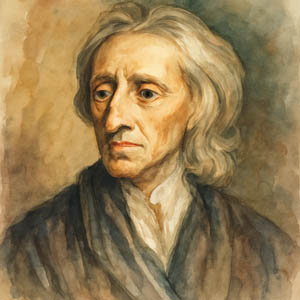 Born on this day in 1632, English philosopher John Locke believed that human beings are born with a tabula rasa—a blank slate—upon which experience writes. His revolutionary ideas about reason, equality, and the rights of individuals helped shape the foundation of modern democracy.
Born on this day in 1632, English philosopher John Locke believed that human beings are born with a tabula rasa—a blank slate—upon which experience writes. His revolutionary ideas about reason, equality, and the rights of individuals helped shape the foundation of modern democracy.
In his Essay Concerning Human Understanding, Locke argued that knowledge comes not from innate ideas but from lived experience. "It's one thing to show a man that he is in error, and another to put him in possession of truth," he wrote.
His thoughts on liberty and government influenced the American founders, especially Thomas Jefferson. Locke’s belief that those in power must have the consent of the governed: "Whenever law ends, tyranny begins," remains a cornerstone of democratic thought.
He challenged authority, opposed the divine right of kings, and trusted that individuals, when free, could govern themselves through reason. "New opinions are always suspected," he noted, "not because they are wrong, but because they are unfamiliar."
Locke celebrated the complexity of language and the struggle to define truth. "So difficult is it to show the various meanings and imperfections of words when we have nothing else but words to do it with." His clarity still illuminate paths toward progress.

 Your
Your